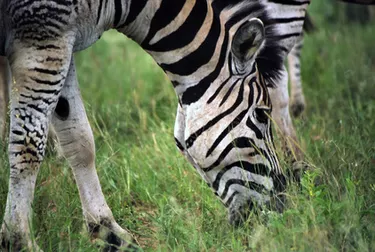
A zoologist is a biologist who studies animals. She investigates the anatomy, characteristics, behavior, distribution, diet, physiology, genetics and evolution of animal species. A zoologist works in close association with animals either in their natural habitat, in captivity or in laboratory conditions.
If you're interested in a zoologist career, you'll usually be required to have been university educated, often to the master's or doctoral level. So, where do zoologists work? Once qualified, you can find a variety of employment opportunities in a number of settings such as zoos, government agencies, medical research facilities, non-governmental organizations, academia and private companies.
Video of the Day
Video of the Day
Jobs at Zoos and Museums
A zoologist can work in a zoo or museum as an educator, curator or keeper. Animal educators focus on providing information to visitors about the animals on display and the work that the institution does. Zoo curators concentrate on acquiring animals for the zoo--by captive breeding programs, loaning or purchasing animals from other organizations, or from the wild.
A zoologist career as a curator usually requires you to hold an advanced university degree. A bachelor's degree is sufficient to work as a zookeeper, who is responsible for managing and caring for the animals in a zoo. A zoologist would have similar duties working as a park ranger or ranch manager.
Government Zoologist Career Options
Employment opportunities exist for zoologists across a variety of government agencies, at federal, state and local level. Positions are available in research, wildlife management, conservation and agriculture – which could involve ensuring environmental laws are observed and monitoring livestock protocols. A zoologist may also find employment in agencies that do not at first appear related to zoology, such as the Department of Energy and the U.S. Geological Survey.
Zoologist Careers in Medical Research
A zoologist can work as a medical laboratory research technician investigating the efficacy of medical treatments. This involves taking care of animals used for experiments, collecting data from those experiments and presenting findings. He may investigate the effects of a particular drug or procedure, study a particular disease, or conduct research on epidemics and immunology. Zoologists who want to work in research may need to earn a Ph.D.
Zoologist Jobs at Non-Governmental Organizations
Charitable and not-for-profit organizations also employ zoologists. These include animal or environmental charities and international bodies such as UNESCO (United Nations Educational, Scientific and Cultural Organization). Positions may concern policy, writing reports, conducting literature reviews, performing field research, volunteer coordination, project management or public outreach.
Zoologist Career Options in Academia
Zoologists may wish to pursue teaching as a profession. Opportunities are available in schools, colleges, science centers and museums. A zoologist can combine teaching and research by working at a university, where she will instruct undergraduate and graduate students, and conduct and publish original research.
Private Sector Jobs for Zoologists
A zoologist can also find employment positions within private companies. Chemical, pharmaceutical, agricultural and petroleum companies all employ zoologists, often in a research and development capacity, although he could also be involved in monitoring pollution from a site, analyzing a company's impact on the environment and assessing land use. A zoologist may also work for a private company in a management, administrative or consultative role.
Zoologist Career Outlook and Salary
The Bureau of Labor Statistics predicts slow job growth at five percent for both wildlife biologists and zoologists through 2030. This would create 1,000 jobs, but more positions would be available due to career changes. The median zoologist salary in May 2021 was $64,650 annually.